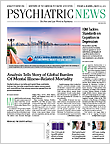Studies have shown that when symptoms of a depressed mother remit after treatment, her offspring’s psychiatric symptoms decrease. A study published in AJP in Advance may shed light on antidepressant-treatment options that could lead to this domino effect.
Myrna Weissman, Ph.D., a professor of psychiatry and chief of the Division of Clinical and Genetic Epidemiology at the New York State Psychiatric Institute, and colleagues studied mothers with depression and their school-age children to compare which antidepressants taken by the mothers might eventually lead to fewer psychiatric symptoms in their offspring.
“We have known for some time now that depression can be a familial disorder. The offspring of depressed parents—especially mothers—often have high rates of depression,” Weissman told Psychiatric News. “Not until recently [did we find] that if a mother’s symptoms of depression are improved, so would those of her children. This is important because not only is the well-being of the mother improving but also that of the child.”
According to Weissman, in the previous studies finding an association between the remission of depression in mothers and reduced psychiatric symptoms in offspring, cognitive-behavioral therapy had been used. “In this study, we wanted to investigate whether the improvements could be seen in a controlled clinical trial with antidepressants, since medication is used more frequently in the treatment of depression than is psychotherapy.”
The study subjects were 76 depressed mothers aged 18 to 65 and 135 offspring aged 7 to 17. Maternal participants were given escitalopram, bupropion, or a combination for 12 weeks. The offspring’s psychiatric symptoms were assessed prior to maternal initiation of therapy and at study endpoint.
Though the mothers in all three groups were able to achieve remission, escitalopram alone was found to be associated with statistically significant improvement in the mothers’ depression and subsequent improvements in the offspring’s psychiatric symptoms, whereas treatment with bupropion and combined bupropion and escitalopram therapy was not.
In addition, mothers in the escitalopram cohort were more likely to report improvement in their ability to listen to and talk with their children over the 12-week study than mothers in the bupropion or combined therapy groups. Children in the escitolapram group reported their mothers to be more caring after treatment.
“Antidepressants that reduce symptoms of anxiety and irritability—like escitalopram—may be necessary to properly assess the impact of the parents’ remission on the well-being of their offspring,” said Weissman.
The researchers noted that the findings highlight the importance of active treatment of depressed mothers, which may help improve the relationship between mother and child.
Weissman told Psychiatric News that she and her colleagues are conducting comparative studies with other medications to assess the effect of antidepressant-dependent remission in mothers on their offspring’s psychiatric symptoms.
The study was funded by the National Institute of Mental Health. ■
An abstract of “Treatment of Maternal Depression in a Medication Clinical Trial and Its Effect on Children” can be accessed
here.

